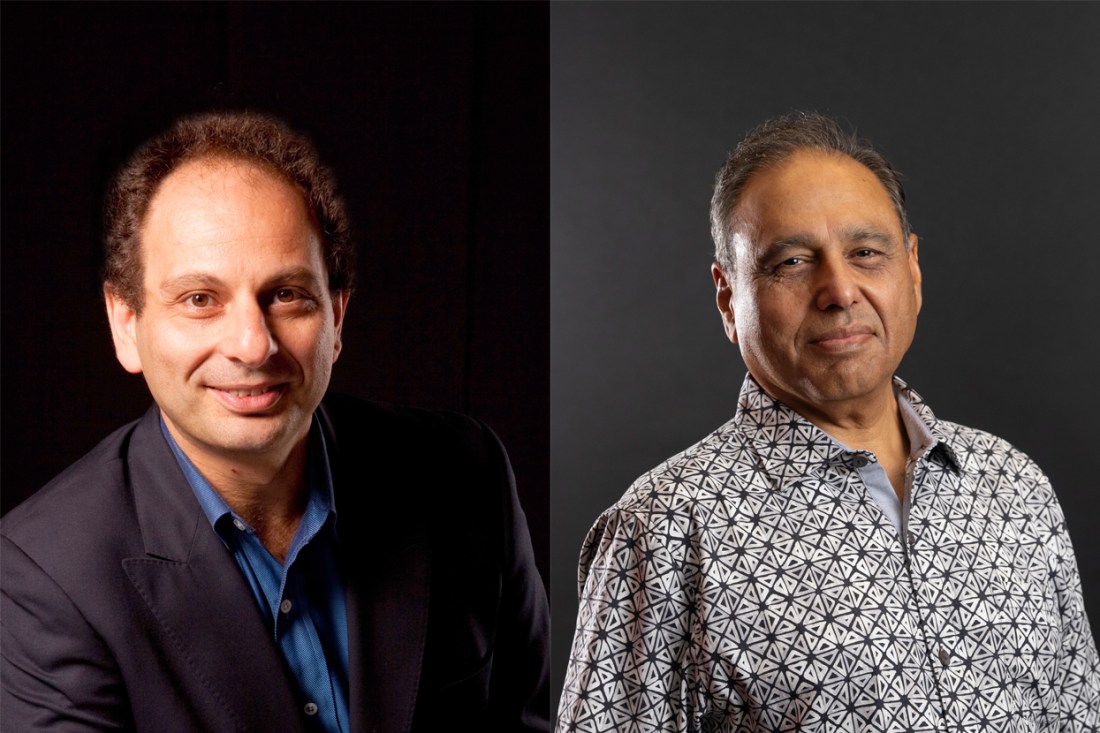[ad_1]
They’ve founded startups and led companies.
Now Naeem Zafar and Aleks Gollu are bringing entrepreneurship into the classroom as the inaugural professors of innovation on Northeastern’s Oakland campus.
“We are going to expose students to what’s possible,” says Zafar, founding CEO of TeleSense, an IoT (Internet of Things) company in Silicon Valley.
“When they see other entrepreneurs, they’ll realize there’s more than one way to live and make money. They’ll realize, ‘I could be a job giver. I don’t have to be a job taker,’” Zafar says.
Today’s freshmen students “are most likely going to have multiple careers in their lifetime,” says Gollu, who has started three companies including 11Sight, a customer engagement platform.
“We are living at a time when the only constant is change. And it’s fair to say change is accelerating. So the key thing they need to learn is how to learn,” Gollu says.
An innovation hub
Both Gollu and Zafar, who hold positions with Northeastern’s D’Amore-McKim School of Business, have had experience teaching Northeastern students in the past.
They say what makes the Oakland campus unique is the combination of the university’s emphasis on experiential learning and entrepreneurship, and the opportunities provided in the Bay Area and nearby Silicon Valley.
Gollu and Zafar say the Oakland students in their innovation courses will hear guest speakers from high-tech and other companies and learn about opportunities for co-ops and internships at startups and established businesses.

“We’ll give them examples of real entrepreneurs who created a company with $100 in savings,” Zafar says.
In case after case, students will study what other resources entrepreneurs used to get started so they gradually develop an entrepreneurial mindset, he says.
The goal is to make the Oakland campus a destination for students interested in innovation and entrepreneurship, Zafar says.
“If you do a good job building a community connected to local businesses and entrepreneurs, then — and only then — we can transform (the campus) into an innovation hub,” he says.
Oakland as ‘the fourth startup’
Gollu says an Oakland colleague told him to consider his new role on campus “as your fourth startup. What you’re really excited about is growing this new campus.”
In his innovation course, students learn theory — such as the difference between disruptive innovation and sustaining innovation — but will also apply market research techniques by dividing up into teams to design fundable projects that ultimately will be reviewed by a panel of stakeholders and investors.
The projects are primarily focused on business ideas about improving student life on campus, such tracking lines and wait times, ways to barter goods such as books and clothing and an app to organize closets, Gollu says.
He says students will work with other departments on campus, including engineering, arts and design and even the Oakland campus farm to design a composting system and other sustainable environmental solutions.
“Entrepreneurship needs to be interdisciplinary,” says Gollu, who adds that social entrepreneurship is a natural fit for the Oakland campus.
“This gives us a huge opportunity for a platform where you teach entrepreneurship and innovation with society in mind. Not necessarily, ‘I want to build a billion dollar unicorn, but I want to make this world better.’”
You don’t have to be an entrepreneur to innovate
Zafar says he’s been involved in seven startup companies — five as CEO — and knows how satisfying the experience can be.
“You’re making the rules. You are deciding what problems to solve. You’re choosing which person you want to work with,” he says.
But even students who don’t wind up as entrepreneurs will benefit from innovation and entrepreneurship courses, Zafar says.
“Many of these people will never start a company. And that’s perfectly reasonable,” he says.
“What the entrepreneurial mindset gives you is a way to solve problems with limited resources — against opposition, when you have no power.”
“That skill, once learned, is useful,” Zafar says. “You could be a real estate agent. You could be working for IBM — and those skills would be relevant.”
Entrepreneurship and innovation courses teach the type of real-world skills that make Northeastern students highly employable, Gollu says.
“There are certain concepts, like building a team, having trust among team members, resilience, perseverance — these are concepts that always survive,” Gollu says.
Showcasing experiential entrepreneurship
The innovation courses are just one way the Oakland campus has embraced experiential entrepreneurship.
Already this fall it has connected Bay Area employers with students in a two-day program of site visits and panel discussions and a Global Entrepreneurship Week hackathon during which students worked on solutions to benefit the Oakland community.
“The teaching philosophy of Northeastern is experiential learning,” Gollu says. “It’s not only about seeing and hearing but understanding.”
Cynthia McCormick Hibbert is a Northeastern Global News reporter. Email her at c.hibbert@northeastern.edu or contact her on X/Twitter @HibbertCynthia.
[ad_2]
Source link
